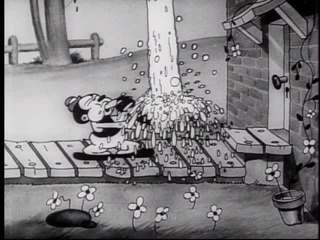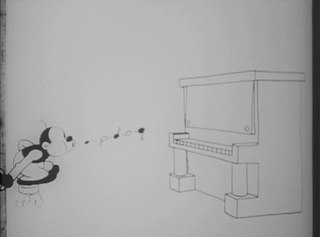Related Research Articles

Bosko is an animated cartoon character created by animators Hugh Harman and Rudolf Ising. Bosko was the first recurring character in Leon Schlesinger's cartoon series and was the star of thirty-nine Looney Tunes shorts released by Warner Bros. He was voiced by Carman Maxwell, Johnny Murray, and Billie "Buckwheat" Thomas during the 1920s and 1930s and once by Don Messick during the 1990s.

Bosko the Doughboy is a one-reel 1931 short subject animated cartoon, part of the Bosko series. It was directed by Hugh Harman, and first released on October 17, 1931 as part of the Looney Tunes series from Harman-Ising Productions and distributed by Warner Bros.

Sinkin' in the Bathtub is the first Warner Bros. theatrical cartoon short as well as the first of the Looney Tunes series. The short debuted in April 1930, at the Warner Bros. Theater in Hollywood. The cartoon features Bosko, and the title is a pun on the 1929 song Singin' in the Bathtub. The film was erroneously copyrighted under the same title as the 1929 song.

Bosko, the Talk-Ink Kid is a 1929 live-action/animated short film produced to sell a series of Bosko cartoons. The film was never released to theaters, and therefore not seen by a wide audience until 2000 on Cartoon Network's television special Toonheads: The Lost Cartoons. The film was produced on May 29, 1929 and directed by Hugh Harman and Rudolf Ising.

I Haven't Got a Hat is a 1935 animated short film, directed by Isadore Freleng for Leon Schlesinger Productions as part of the Merrie Melodies series. Released on March 2, 1935, the short is notable for featuring the first appearance of several Warner Bros. cartoon characters, most notably future cartoon star Porky Pig. Beans the Cat, a minor Looney Tunes star in 1935-1936, also made his first appearance in this cartoon.

Hold Anything is the third short in the Looney Tunes series from Warner Bros., released to theaters in October 1930. Featuring Bosko, it is loosely based on the lost film Hold Everything, one of whose songs, "Don't Hold Everything," features prominently in the cartoon. It was directed by Hugh Harman and Rudolf Ising, and animated by Isadore "Friz" Freleng and Norman Blackburn.
Bosko's Picture Show is a Warner Bros. Looney Tunes animated short directed by Hugh Harman and Friz Freleng. It was the last Looney Tunes Bosko cartoon produced by Hugh Harman and Rudolf Ising for Leon Schlesinger and Warner Bros. The duo moved on to produce cartoons for MGM, the first of which were released in 1934. The music score was a work of Frank Marsales.
Ride Him, Bosko! released in 1932, is a Western animated short film in Warner Bros.' Looney Tunes series. It features Bosko, Warner Bros.' first cartoon character and his sweetheart Honey in the Old West.
Bosko's Parlor Pranks is a 1934 Happy Harmonies cartoon produced by Hugh Harman and Rudolph Ising for Metro-Goldwyn-Mayer starring their character Bosko. It is the first Bosko cartoon produced in color, and the first made at MGM following the Harman-Ising studio ending its deal to produce Looney Tunes and Merrie Melodies for Warner Bros. and Leon Schlesinger. Warner Bros. would later own Happy Harmonies and the MGM cartoon studio through its Turner Entertainment Co. banner.
Bosko the Musketeer is an American animated short film. It is a Looney Tunes cartoon, featuring Bosko, the first star of the series. It was released on August 12, 1933, although some sources note September 16 as a date; this is problematic, as that would imply that the last films featuring Bosko as the star of Warner Bros. cartoons were released after the first film featuring Buddy, the second star of the series. It was, like most Looney Tunes of the time, directed by Hugh Harman; Frank Marsales was the musical director.

Bosko's Holiday is a one-reel 1931 short subject animated cartoon, part of the Bosko series. It was directed by Hugh Harman, and first released on July 18, 1931 as part of the Looney Tunes series from the Leon Schlesinger animation studio and distributed by Warner Brothers. The film score was composed by Frank Marsales.
Big Man from the North is an American animated short film. It is a Looney Tunes cartoon, featuring Bosko, the first star of the series. It was released in January 1931, although some sources give an unspecified date in 1930. It was, like most Looney Tunes of the time, directed by Hugh Harman and Rudolf Ising; Frank Marsales was the musical director.

Dumb Patrol is a 1931 one-reel short subject, part of the Looney Tunes series. It was released in May 1931 and is directed by Hugh Harman and Rudolf Ising. The film score was composed by Frank Marsales.
Yodeling Yokels is a 1931 one-reel short subject featuring Bosko; it is part of the Looney Tunes series. It was released in June 1931 and is directed by Hugh Harman and Rudolf Ising. The film score was composed by Frank Marsales.

Bosko's Fox Hunt is a 1931 one-reel short subject featuring Bosko as part of the Looney Tunes series. It was released on December 12, 1931 and is directed by Hugh Harman. The film score was composed by Frank Marsales.

Bosko's Store is a 1932 Warner Bros. Looney Tunes cartoon directed by Hugh Harman. It was released on August 13, 1932, and stars Bosko, the first star of the series. As is the case with most Looney Tunes of its time, it was directed by Hugh Harman and its music scored by Frank Marsales.
Bosko in Person is an American animated short film featuring Bosko. It is a Looney Tunes cartoon, featuring Bosko, the original star of the series. It was released on February 11, 1933, though one source claims the release date is April 10, 1933. Like most Looney Tunes of its day, it was directed by Hugh Harman; its score is by Frank Marsales. The film features Bosko and Honey in a vaudeville-act. This is the second cartoon directed by Friz Freleng.

Battling Bosko is an American animated short film. It is a Looney Tunes cartoon, featuring Bosko, the original star of the series. Like most Looney Tunes of its day, it was directed by Hugh Harman; Frank Marsales provided musical direction. The film was released in 1932, though one source gives an ambiguous date of 1931–1932.
Big-Hearted Bosko is a 1932 Warner Bros. Looney Tunes cartoon, featuring Bosko, the original star of the series. It was released on March 5, 1932, although one source offers for it only an ambiguous release date of 1931–1932. It was, like most Looney Tunes of its time, directed by Hugh Harman; its musical direction was by Frank Marsales.

Bosko the Lumberjack is an American animated short film, released September 3, 1932, though one source gives only an ambiguous release date of 1931–1932. It is a Looney Tunes cartoon, featuring Bosko, the original star of the series. Like most Looney Tunes of its day, it was directed by Hugh Harman; its musical direction was by Frank Marsales.
References
- ↑ Lenburg, Jeff (1999). The Encyclopedia of Animated Cartoons. Checkmark Books. pp. 57–58. ISBN 0-8160-3831-7 . Retrieved June 6, 2020.
- ↑ Beck, Jerry; Friedwald, Will (1989). Looney Tunes and Merrie Melodies: A Complete Illustrated Guide to the Warner Bros. Cartoons. Henry Holt and Co. p. 7. ISBN 0-8050-0894-2.